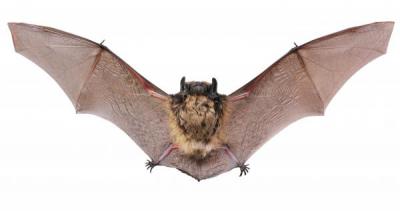Like any mammal, bats can carry rabies. Rabies is a nearly 100% fatal virus spread in the saliva of infected mammals (i.e., animals that have fur). Most bats do not have rabies. However, any bat that is active by day or is found in a place where bats are not usually seen, such as inside a building or your home, could be sick. A bat that does not fly well or is easily approached is likely ill. It’s important to stay away from a sick bat. The only way to be certain if a bat has rabies is to do a laboratory test. If you notice a bat in your home, immediately call the Fairfax County Animal Protection Police (APP) at 703-691-2131 so they can determine the best course of action.
If a human or companion animal (e.g., dog, cat) has been potentially bit or scratched by a bat, the Fairfax County Health Department Laboratory will test the bat at no cost. Do not begin rabies postexposure prophylaxis (PEP) prior to receiving the lab tests, which are typically available within 24 hours after the bat received by the lab.
If the bat tests negative for rabies, no further action is needed on your part. If the bat tests positive for rabies, whoever came into contact with, or was sleeping in the same room where the bat was found, might need PEP treatment. PEP is important because rabies is a fatal disease if not treated. For most persons, PEP consists of one dose of rabies immunoglobulin and four doses of rabies vaccine. The vaccine is given over the course of two weeks. PEP is incredibly effective in preventing rabies.
The Fairfax County Health Department Rabies Program is available to assist physician’s 24/7/365 to help assess potential rabies exposures at 703-246-2433.
Bats in Fairfax Health District
Bats are an important part of the ecosystem, with each one eating thousands of insects, including mosquitoes, each night. While there are 17 species of bats in Virginia, only eight species are found in Fairfax Health District, including: Big Brown Bat, Tri-Colored Bat (formerly Eastern Pipistrelle, Eastern Red Bat, Evening Bat, Hoary Bat, Little Brown Bat, Northern Long-eared Bat, and Silver-haired Bat. To get more information on each species, see the Virginia Department of Game and Inland Fisheries species booklets. Big Brown Bats are the most often reported type of bat to enter people’s homes. Three of the species (i.e., Northern Long-eared, Little Brown, Tri-colored) found in the Fairfax Health District are listed as state or federally threatened or endangered.
How do I know if I am at risk of getting rabies from the bat?
Just being in a room with a bat, or seeing a bat, does not mean you were exposed to rabies. You must have direct contact with wet saliva from a bat, such as a bite or scratch, to be considered at risk of getting rabies. Bats have small teeth that may not leave a visible mark after contact with your skin. If a person was in the same room as a bat and might be unaware that a bite or direct contact occurred (e.g., a sleeping person awakens to find a bat in the room or an adult witnesses a bat in the room with a previously unattended child, mentally disabled person, or intoxicated person) then a possible rabies exposure cannot be ruled out. It is best to have the bat tested so that exposed persons do not get PEP unnecessarily.
I found a bat in my home, what do I do?
Finding a bat in your home can be scary. However, most of the time homeowners don’t know the bats are there because the bats stay hidden and usually do not enter occupied areas of the house. If you do find a bat in your home, follow these steps:
- DO NOT let the bat go.
- If possible, shut the bat in an empty room and put a towel under the door to prevent its escape. Make sure people and pets are not in the room when it is enclosed.
- Call the Fairfax County Animal Protection Police at 703-691-2131. They will safely remove the bat from the living space of your house. Most of the time the bat is let go. However, when a bat may have exposed a person or pet to rabies, it will be sent for rabies testing at no cost to the homeowner.
- If you were bitten or scratched, immediately wash the wound thoroughly and seek medical attention.
These recommendations are made as a precaution, because people, children and the elderly especially, may be unaware of a bite from tiny bat teeth.
How do I get rid of a bat roost in my home?
For Homeowners:
If you own your home and think bats are roosting in your house, call a pest control company to help exclude (not kill) the bats from your home. Bats should not be excluded from a structure from May through August because that’s when bats are having their babies and you would be separating parents from their children.
For Tenants:
If you rent your home, your landlord should contact a pest control company. If your landlord refuses to contact one for you, you can report the issue to the Department of Code Compliance at 703-324-1300. Code Compliance will not remove the bats for you or hire a pest control company, but they will work with you and your landlord to bring the home into compliance with the Virginia Maintenance Code and get rid of the bat roost.
More information on correct bat exclusion practices can be found here:
- Bats
- Wildlife Information (Virginia Department of Wildlife Resources)
- Bats (CDC)
- Avoid risk of rabies from bats(CDC)
How do I get more information?
For more information on bats or rabies, call the Fairfax County Health Department Rabies Program at 703-246-2433.

